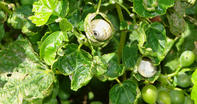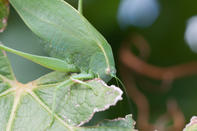Snails
Different snails are found in the Western Cape, for example, the brown garden snail, white dune snail and the banded conical snail. Snails move up against the vine’s trunk and damage the buds and young growth and feed on the leaves.

Vines should be regularly monitored to determine contamination. Chemical control can be carried out using snail bait that is applied under moist conditions and ducks are used as biological control for snails. Control cover crops and weeds and plant a cover crop that does not attract snails. Pay attention to breeding spots of snails outside the vineyard, for example along watercourses.
Long-horned Grasshoppers

Long-horned grasshoppers are cricket-like flying insects that severely damage vineyards. Holes in the leaves are a symptom of infection. Different than snout beetles which feed on grapevine leaves around the edges of the leaves, long-horned grasshoppers feed anywhere on the leaves.
Climate is probably a contributing factor to the appearance of long-horned grasshoppers: a warm, dry winter benefits the hatching of eggs.
There are no registered chemical pesticides against this grasshopper, but contact pesticides for snout beetles may also limit their occurrence. There are currently studies done on the possible biological control of long-horned grasshoppers with fungi and bio-predators.
By Vinpro